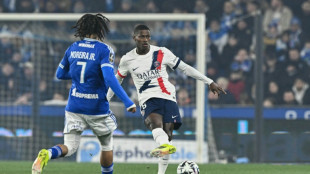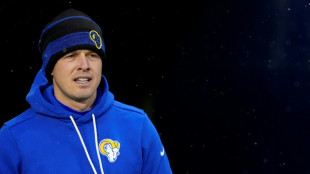-
 Venezuelan activist ends '1,675 days' of suffering in prison
Venezuelan activist ends '1,675 days' of suffering in prison
-
Real Madrid scrape win over Rayo, Athletic claim derby draw

-
 PSG beat Strasbourg after Hakimi red to retake top spot in Ligue 1
PSG beat Strasbourg after Hakimi red to retake top spot in Ligue 1
-
NFL Cardinals hire Rams' assistant LaFleur as head coach

-
 Arsenal scoop $2m prize for winning FIFA Women's Champions Cup
Arsenal scoop $2m prize for winning FIFA Women's Champions Cup
-
Atletico agree deal to sign Lookman from Atalanta

-
 Real Madrid's Bellingham set for month out with hamstring injury
Real Madrid's Bellingham set for month out with hamstring injury
-
Man City won't surrender in title race: Guardiola

-
 Korda captures weather-shortened LPGA season opener
Korda captures weather-shortened LPGA season opener
-
Czechs rally to back president locking horns with government

-
 Prominent Venezuelan activist released after over four years in jail
Prominent Venezuelan activist released after over four years in jail
-
Emery riled by 'unfair' VAR call as Villa's title hopes fade

-
 Guirassy double helps Dortmund move six points behind Bayern
Guirassy double helps Dortmund move six points behind Bayern
-
Nigeria's president pays tribute to Fela Kuti after Grammys Award

-
 Inter eight clear after win at Cremonese marred by fans' flare flinging
Inter eight clear after win at Cremonese marred by fans' flare flinging
-
England underline World Cup
credentials with series win over Sri Lanka

-
 Guirassy brace helps Dortmund move six behind Bayern
Guirassy brace helps Dortmund move six behind Bayern
-
Man City held by Solanke stunner, Sesko delivers 'best feeling' for Man Utd

-
 'Send Help' debuts atop N.America box office
'Send Help' debuts atop N.America box office
-
Ukraine war talks delayed to Wednesday, says Zelensky

-
 Iguanas fall from trees in Florida as icy weather bites southern US
Iguanas fall from trees in Florida as icy weather bites southern US
-
Carrick revels in 'best feeling' after Man Utd leave it late

-
 Olympic chiefs admit 'still work to do' on main ice hockey venue
Olympic chiefs admit 'still work to do' on main ice hockey venue
-
Pope says Winter Olympics 'rekindle hope' for world peace

-
 Last-gasp Demirovic strike sends Stuttgart fourth
Last-gasp Demirovic strike sends Stuttgart fourth
-
Sesko strikes to rescue Man Utd, Villa beaten by Brentford

-
 'At least 200' feared dead in DR Congo landslide: government
'At least 200' feared dead in DR Congo landslide: government
-
Coventry says 'sad' about ICE, Wasserman 'distractions' before Olympics

-
 In-form Lyon make it 10 wins in a row
In-form Lyon make it 10 wins in a row
-
Man Utd strike late as Carrick extends perfect start in Fulham thriller

-
 Van der Poel romps to record eighth cyclo-cross world title
Van der Poel romps to record eighth cyclo-cross world title
-
Mbappe penalty earns Real Madrid late win over nine-man Rayo

-
 Resurgent Pakistan seal T20 sweep of Australia
Resurgent Pakistan seal T20 sweep of Australia
-
Fiji top sevens standings after comeback win in Singapore

-
 Alcaraz sweeps past Djokovic to win 'dream' Australian Open
Alcaraz sweeps past Djokovic to win 'dream' Australian Open
-
Death toll from Swiss New Year bar fire rises to 41

-
 Alcaraz says Nadal inspired him to 'special' Australian Open title
Alcaraz says Nadal inspired him to 'special' Australian Open title
-
Pakistan seeks out perpetrators after deadly separatist attacks

-
 Ukraine war talks delayed to Wednesday, Zelensky says
Ukraine war talks delayed to Wednesday, Zelensky says
-
Djokovic says 'been a great ride' after Melbourne final loss

-
 Von Allmen storms to downhill win in final Olympic tune-up
Von Allmen storms to downhill win in final Olympic tune-up
-
Carlos Alcaraz: tennis history-maker with shades of Federer

-
 Alcaraz sweeps past Djokovic to win maiden Australian Open title
Alcaraz sweeps past Djokovic to win maiden Australian Open title
-
French IT giant Capgemini to sell US subsidiary after row over ICE links

-
 Iran's Khamenei likens protests to 'coup', warns of regional war
Iran's Khamenei likens protests to 'coup', warns of regional war
-
New Epstein accuser claims sexual encounter with ex-prince Andrew: report

-
 Italy's extrovert Olympic icon Alberto Tomba insists he is 'shy guy'
Italy's extrovert Olympic icon Alberto Tomba insists he is 'shy guy'
-
Chloe Kim goes for unprecedented snowboard halfpipe Olympic treble

-
 Pakistan combing for perpetrators after deadly separatist attacks
Pakistan combing for perpetrators after deadly separatist attacks
-
Israel partially reopens Gaza's Rafah crossing

Why Russia can’t end war
Nearly four years into Moscow’s full‑scale invasion of Ukraine, there is no sign that the Kremlin is preparing to withdraw its troops or relinquish occupied territories. The war has devastated Ukrainian infrastructure and caused horrific human rights violations, yet the Russian government shows little appetite for ending the conflict. This refusal is rooted in ideology, domestic politics, military calculations, economic factors and public opinion. Understanding why Russia cannot end the war requires examining each of these dimensions.
Ideological and historical motivations
At its core, the conflict is driven by a belief that Ukraine belongs in Russia’s sphere of influence. The Kremlin demands that the West respect a kind of “Monroe doctrine” for Russia and stop bringing neighbouring states into the Western alliance. Preventing Ukraine from joining NATO and reasserting dominance over the former Soviet space are central goals. Russian leaders portray the war as an existential struggle against Western encirclement and a continuation of Russia’s fight for great‑power status. This ideological framing means that a negotiated end that leaves Ukraine free to choose its alliances is viewed as defeat. The war thus fulfils a narrative of historical justice and national revival, making withdrawal politically unpalatable.
Regime survival and domestic politics
The invasion has become a pillar of the Russian political system. Moscow’s leadership invests significant resources in the military‑industrial complex and dedicates roughly two‑fifths of its federal budget to defence and security. Reversing course could call into question the enormous human and economic costs already incurred—nearly a million Russian casualties—and undermine the regime’s legitimacy. Analysts note that President Vladimir Putin uses the war to consolidate patronage networks and justify increasing authoritarian control. Domestic opposition is suppressed, and state media portrays the conflict as necessary for Russia’s security. In this environment, there is little public pressure to end the war; volunteer recruitment continues thanks to high bonuses, replenishing losses, and those who favour peace often support a cease‑fire only if Moscow retains its territorial gains.
Ending the war would also create a dilemma. A cease‑fire that left Russia occupying vast areas of Ukraine would require Moscow to maintain a huge army of conscripts and volunteers, consuming resources and risking domestic discontent. Demobilising this army could trigger unemployment and social unrest. For the Kremlin, continued fighting is therefore less risky than an abrupt peace that could threaten its grip on power.
Military stalemate and strategic calculations
Despite substantial casualties and equipment losses, Russian forces continue offensive operations because Moscow believes time favours its strategy. Experts estimate Russia loses around 100–150 troops per square kilometre, yet the leadership expects to outlast Ukraine and the West. A cease‑fire that leaves Ukraine free to integrate with NATO is unacceptable to the Kremlin. Conversely, Ukraine refuses to renounce NATO membership or surrender occupied territories. This stalemate means neither side will compromise until the costs become unbearably high.
Russia’s war machine has adapted to attritional fighting. Moscow has scaled up drone production and directed its industrial base toward a war economy, offsetting heavy losses in conventional arms. Analysts warn that each year of offensive operations costs Russia 8–10 % of its GDP and hundreds of thousands of casualties. Yet the regime calculates that these losses are sustainable if they help achieve strategic objectives. Until Ukraine’s armed forces and its foreign backers impose unbearable military costs, Moscow has little incentive to cease hostilities.
War economy and financial resilience
The Russian economy has proven more durable under sanctions than many expected. Years of tight fiscal policy allowed Moscow to accumulate large foreign exchange reserves and build a “Fortress Russia” economy. By early 2022, Russia held over $600 billion in reserves and kept public debt below one‑fifth of GDP. Current account surpluses and high energy revenues enabled the government to continue funding the war. War spending has stimulated industrial output and driven nominal GDP growth, while the departure of international firms has reduced competition, allowing domestic companies to gain market share.
However, this resilience masks growing imbalances. Defence spending has added about $100 billion per year to the budget, and the combined economic losses from sanctions and war are estimated at trillions of US dollars. Economists note that real GDP growth is roughly a tenth smaller than it would have been without the war. The war economy has created labour shortages; up to two million Russians are abroad and hundreds of thousands have been killed or wounded. Industrial capacity is nearing its limits, inflation remains high, and Russia’s central bank has raised interest rates sharply. Analysts warn that this stagflationary environment could erode living standards and strain public finances. The state has been forced to draw down its National Wealth Fund and raise taxes to cover growing deficits. Yet the economic costs have not prompted a policy change; propaganda and repression continue to dampen discontent.
Public sentiment and the social contract
Russian society has largely adapted to wartime conditions. While surveys indicate that many Russians are weary of the conflict, most support peace only if it secures Moscow’s territorial gains. As long as the Kremlin presents the war as protecting Russian speakers and defending the nation against Western aggression, domestic support remains sufficient. Humanitarian gestures such as prisoner exchanges or grain exports can boost support for talks, but there is no broad movement demanding withdrawal. The combination of propaganda, control of the media and modest improvements in wages for some sectors has kept dissatisfaction at bay. Without a significant shift in public opinion, there is little internal pressure on leaders to end the war.
International dynamics and peace prospects
External actors have limited leverage over Russia’s decision‑making. Western sanctions have slowed economic growth and restricted access to technology, but they have not forced Moscow to change course. Alternative supply chains through China, Iran and North Korea provide military inputs. Diplomatic efforts, including U.S.–Russia talks and European mediation, have yet to produce progress. Commentators note that Russia views negotiations as a means to impose its terms; absent recognition of its sphere of influence, it prefers to continue the war. Meanwhile, Western political fatigue and competing global crises reduce the likelihood of sustained pressure on Russia. Unless Ukraine and its partners can decisively shift the military balance or undermine the economic foundations of the war, the Kremlin is unlikely to agree to a settlement.
Conclusion
Russia’s inability to end the war in Ukraine stems from a combination of ideological ambitions, regime survival, military calculations, economic adaptation and public acquiescence. The conflict serves the Kremlin’s strategic goals of preventing Ukraine’s Western integration and reasserting Russian dominance.
It sustains the domestic political order and justifies expanding authoritarian control. Despite immense losses and economic strain, Moscow calculates that continuing the war is less risky than accepting a negotiated peace that would leave its goals unmet. Until these underlying drivers change—through decisive military setbacks, deeper economic crises or a shift in public sentiment—Russia’s war in Ukraine is likely to endure.

Underwater Wi-Fi: European startups woo investors

Cultural year 2024: between Qatar and Morocco

Planning a wellness break? Poland!

Studio Kremlin: creative co-working in Paris

Culture: Serbia’s architectural marvels

EU Residence permits: Record level to third nationals

Trump announces Homan as new 'border czar'

EU: How do we deal with Donald Trump?

Watch Live: Trump or Harris? America votes!

Georgia: Ruling party celebrates election victory

Asylum seekers: Return centres – a Solution?



